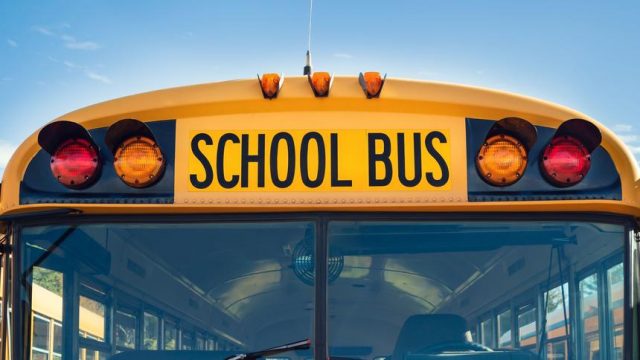Supreme Court Ruling Could Have Big Implications for School Choice Policy in North Dakota

Front closeup view of a yellow school bus
For years now proponents of school choice here in North Dakota have proposed policies which would direct, through one mechanism or another, public dollars to private schools. Essentially different iterations of school choice policy, where public dollars follow students to whatever schools their parents choose be they public or private.
The roadblock to implementing this policy is the state constitution which has a version of what’s called the Blaine Amendment.
The original Blaine Amendment was a proposed change to the U.S. Constitution. It failed, but most states in the nation adopted language similar to it into their constitutions, including North Dakota. This language generally prohibits the use of public dollars on institutions of education with a religious affiliation.
This brings us to yesterday’s Supreme Court ruling in Trinity Lutheran Church of Columbia, Inc. v. Comer (opinion at the link).
At issue was public funding for playground resurfacing. The State of Missouri denied that funding to Trinity Lutheran Church citing the the Blaine Amendment language in their state constitution which reads:
That no money shall ever be taken from the public treasury, directly or indirectly, in aid of any church, sect or denomination of religion, or in aid of any priest, preacher, minister or teacher thereof, as such; and that no preference shall be given to nor any discrimination made against any church, sect or creed of religion, or any form of religious faith or worship.
The church filed suit, arguing that it was religious discrimination. In a 7-2 decision, SCOTUS agreed calling the discrimination “odious to our Constitution.” What this means is that the government can’t deny public funds to religious organizations simply because they’re religious. The “separation of church and state” doctrine isn’t enough.
That’s a major victory for religious liberty, though narrowed by a footnote in the opinion which reads: “This case involves express discrimination based on religious identity with respect to playground resurfacing. We do not address religious uses of funding or other forms of discrimination.”
Justices Thomas and Gorsuch dissented from that position, Justice Breyer emphasized it in his concurring opinion, but it’s clear that the majority on the court are in favor of this opinion being read narrowly.
Still, there are implications here for the legality of Blaine Amendment language.
North Dakota’s version of the language is much more narrow than Missouri’s. Here’s how it reads in our state constitution:
No money raised for the support of the public schools of the state shall be appropriated to or used for the support of any sectarian school.
That language would still seem to be in trouble given the SCOTUS ruling in Trinity even if we read it narrowly.
Case in point, a few years ago the Legislature was debating funding for automated external defibrillators in schools. Lobbyists representing the public schools quietly worked lawmakers to deny that funding for religious schools arguing that it would violate the state constitutions Blaine Amendment language.
I think the days of those arguments holding sway are probably over.
The days of that language being invoked against school choice policy, or any other direct public aid for education at private religious schools, are probably not over given how the SCOTUS majority narrowed their opinion.
Still, the Blaine Amendment has been weakened. That’s a win for the proponents of school choice.




